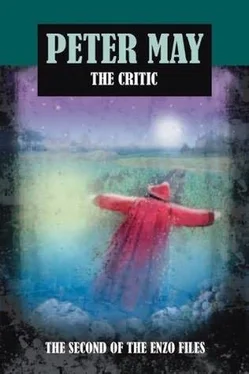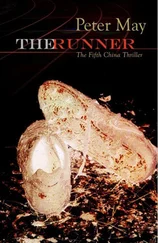Peter May - The Critic
Здесь есть возможность читать онлайн «Peter May - The Critic» весь текст электронной книги совершенно бесплатно (целиком полную версию без сокращений). В некоторых случаях можно слушать аудио, скачать через торрент в формате fb2 и присутствует краткое содержание. Жанр: Классический детектив, на английском языке. Описание произведения, (предисловие) а так же отзывы посетителей доступны на портале библиотеки ЛибКат.
- Название:The Critic
- Автор:
- Жанр:
- Год:неизвестен
- ISBN:нет данных
- Рейтинг книги:5 / 5. Голосов: 1
-
Избранное:Добавить в избранное
- Отзывы:
-
Ваша оценка:
- 100
- 1
- 2
- 3
- 4
- 5
The Critic: краткое содержание, описание и аннотация
Предлагаем к чтению аннотацию, описание, краткое содержание или предисловие (зависит от того, что написал сам автор книги «The Critic»). Если вы не нашли необходимую информацию о книге — напишите в комментариях, мы постараемся отыскать её.
The Critic — читать онлайн бесплатно полную книгу (весь текст) целиком
Ниже представлен текст книги, разбитый по страницам. Система сохранения места последней прочитанной страницы, позволяет с удобством читать онлайн бесплатно книгу «The Critic», без необходимости каждый раз заново искать на чём Вы остановились. Поставьте закладку, и сможете в любой момент перейти на страницу, на которой закончили чтение.
Интервал:
Закладка:
The induction in the photograph was held in a place with tiled floors and vaulted brick arches. ‘Where is this?’ Enzo asked.
‘The vaults of the Abbey Saint-Michel. It’s where we hold our chapters and many of our inductions.’ Old Josse filled both their glasses, then held his up to contemplate the wine. ‘Hard to believe that the vine started life as a forest creeper, climbing tree trunks, twenty, thirty metres, to reach the canopy. The fruit was for the birds, to carry the seeds off to germinate elsewhere. It’s the great thing about Man, you know, that he can shape and bend nature to his will, cut a thirty-metre creeper down to a metre and a half and make it produce fruit to his specifications. And then turn it into something as wonderful as this.’ He took a mouthful. His concentration was intense as he extracted every last moment of pleasure from the wine. Then he beamed, sharp eyes a little less sharp than before, his diction a little more slurred. He looked at Enzo. ‘Who exactly are you, Monsieur Macleod?’
Enzo told him, and Josse thought briefly before taking a sheet of paper from his folder and slipping it across the table. Enzo picked it up. ‘What’s this?’
‘Terms and conditions. If you want to apply to become a chevalier.’
Enzo glanced at the sheet. ‘Don’t I have to be someone who’s done something to promote or advance the wines of Gaillac?’
‘Monsieur, if you can find out who murdered Petty and put this thing to rest once and for all, you’ll have done more for the wines of Gaillac than Petty ever did.’ He took another mouthful of dark, seductive red, sunlight slanting through his glass to illuminate its limpidity. ‘I love this place. I love the wines we make. My father made wine here before me, and now it’s my son who’s the maitre du chai. There’s poetry in the grape, you know. The essence of Man, of civilisation, of sophistication. We’ve done all manner of things. We have circumnavigated the globe, sent spaceships to Mars. But there’s no higher achievement than the making of a fine wine, no greater pleasure than to drink it.’
He indulged in that pleasure once more and eyed Enzo with watery eyes. ‘When I was a boy, we had a contract with the railway, and we sent barrels of a wine called vin bourru every year to Paris where it was drunk in all the bars. It was white, and cloudy and sweet, and still fermenting. Maybe only three percent alcohol. But then after the war, the Europeans told us we couldn’t guarantee the consistency, so effectively it was banned.’ He grinned wickedly. ‘You want to taste it?’
‘You’re still making it?’
‘No, not really. But the white wines in our cuves have just begun their fermentation. And that’s the very stuff we would have sent by rail to Paris. A little taste of history, monsieur.’
No one paid any attention to them as old Josse led Enzo through the chai clutching a couple of fresh glasses. He stopped at one of the cuves and peered myopically at the handwritten label attached to the tap, then muttered his satisfaction. ‘ Loin de l’oeil.’ He opened up the tap and poured them each a half glass. The wine, still in its very early stages of fermentation, was indeed very cloudy, almost yellow. ‘Try it.’ He handed Enzo his glass.
It fizzed on the tongue, sweet and sharp and yeasty, and still warm from the fermentation.
‘I love to have a glass or two at harvest time.’ The old man’s eyes sparkled with mischief. ‘It always feels like raising two fingers to the damned Europeans. They might be able to stop us selling it, but they can’t stop us drinking it.’
The taste of it lingered in Enzo’s mouth as they walked back along the drive to his car. He shook the old man’s hand, and was about to get behind the wheel, when he had a thought. He stopped with one foot already in the car. ‘You said that an application to become a chevalier had to be accompanied by a full CV, nothing left out.’
‘That’s right.’
‘Do you still have Petty’s application and CV?’
‘Of course.’
‘I suppose the police must have asked to see them at the time?’
‘No. The police were only interested in the gown and the hat and gloves and whose they might have been.’
Enzo was almost afraid to ask. ‘Would you let me see them?’
Old Josse grinned. ‘Monsieur, we have drunk the vin bourru together. Of course you can see them.’
II
Enzo followed Paulette Lefevre up the broad stone staircase, sunlight spilling through arrow-slit windows to fall in zigzags across the steps of the old chateau. The swing of her hips was emphasised by the fullness of her calf-length skirt. There was something innately sexual and provocative in it. He wondered if she was aware of it and decided she probably was. In his experience, women were almost always aware of the signals they sent out. Her heels clicked sharply on the stone flags of the first floor landing, then she turned right, through a huge, studded, wooden door, into a vast salon filled with a clutter of old furniture and cardboard boxes. Some of the pieces were covered with dust sheets. An old rocking horse, its paint eroded by time and history, stood in front of an enormous, moulded cheminee, the centrepiece of which was a faded fresco in the process of restoration. Motes of dust hung in the shafts of sunlight squinting in through small windows. Pierric Lefevre looked up from a long, wooden table littered with papers and maps and ancient books with curling yellowed pages. He was riffling through an old ledger of some kind, mottled and stained by centuries of damp.
‘I’ve been going through all this stuff ever since you called. We found most of it, you know, in an old armoire in the east turret when we first bought the place. God knows how it survived.’
Enzo had seen the photographs downstairs in the great dining hall. Pictures Pierric had taken showing the restoration of the Chateau des Fleurs at all its stages. But it was the earliest photographs which were the most dramatic. There had been no floorboards on the first or second floors, and it had been possible to stand in the dining hall and look straight up twenty-five metres to see torn pieces of sky through the roof.
He approached the table, and Pierric turned the age-brittled tome towards him so that he could see it. ‘I think I’ve found what you want. It’s a kind of employment ledger, listing the estate workers, where they lived, how much they were paid.’ He flipped carefully back a couple of pages, and ran his finger down a list of names written in a flamboyant, old-fashioned French script. The ink had faded considerably and was in danger of being lost in the fog of discolouring paper. ‘There.’ He stabbed his finger at an entry. ‘Georges Petit, estate manager. Lived with his family right across the way there in what is now the gite. Right up until 1789, when his employment was terminated.’
Enzo peered at the final entry, which was dated August 12, 1789. It said simply, Emigre. Emigrated.
‘Probably to the New World,’ Pierric said. ‘A lot of people left France for the Americas at the start of the French Revolution.’
Paulette was regarding Enzo with considerable curiosity. ‘How did you know?’
Enzo took a photocopied wad of papers from his bag. ‘Gil Petty’s curriculum vitae, as presented to the Ordre de la Dive Bouteille, to whom he was obliged to reveal all. He took that requirement literally, it seems. Because in it he disclosed that his interest in Gaillac was not just wine-related. His roots were here. His family had emigrated to the United States, he thought early in the nineteenth century. The name Petty is just a corruption of Petit. His ancestor was Georges Petit who lived, as your ledger attests, in the very gite Petty rented when he came here four years ago. For him it was a voyage of discovery. A man in search of his history. Gil Petty was coming home. Although I doubt if he realised for one moment that he was coming home to die.’
Читать дальшеИнтервал:
Закладка:
Похожие книги на «The Critic»
Представляем Вашему вниманию похожие книги на «The Critic» списком для выбора. Мы отобрали схожую по названию и смыслу литературу в надежде предоставить читателям больше вариантов отыскать новые, интересные, ещё непрочитанные произведения.
Обсуждение, отзывы о книге «The Critic» и просто собственные мнения читателей. Оставьте ваши комментарии, напишите, что Вы думаете о произведении, его смысле или главных героях. Укажите что конкретно понравилось, а что нет, и почему Вы так считаете.












